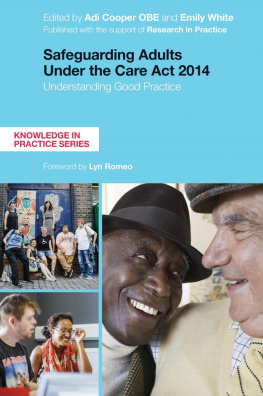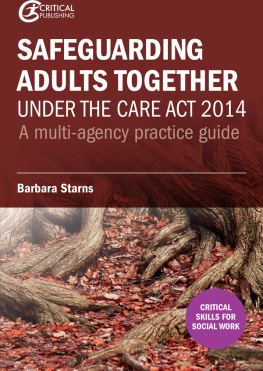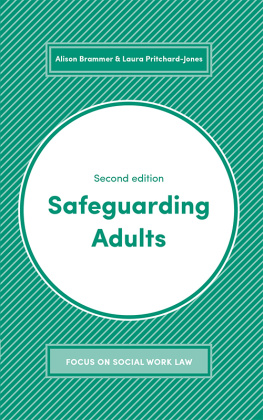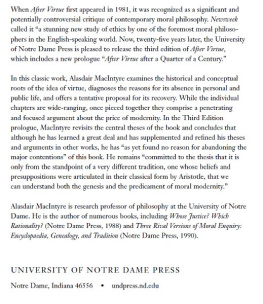SAFEGUARDING ADULTS
SAFEGUARDING ADULTS
KEY THEMES AND ISSUES
GILLIAN MACINTYRE, AILSA STEWART AND PEARSE McCUSKER
Gillian MacIntyre, Ailsa Stewart and Pearse McCusker 2018
All rights reserved. No reproduction, copy or transmission of this publication may be made without written permission.
No portion of this publication may be reproduced, copied or transmitted save with written permission or in accordance with the provisions of the Copyright, Designs and Patents Act 1988, or under the terms of any licence permitting limited copying issued by the Copyright Licensing Agency, Saffron House, 610 Kirby Street, London EC1N 8TS.
Any person who does any unauthorized act in relation to this publication may be liable to criminal prosecution and civil claims for damages.
The authors have asserted their rights to be identified as the authors of this work in accordance with the Copyright, Designs and Patents Act 1988.
First published 2018 by
PALGRAVE
Palgrave in the UK is an imprint of Macmillan Publishers Limited, registered in England, company number 785998, of 4 Crinan Street, London, N1 9XW.
Palgrave and Macmillan are registered trademarks in the United States, the United Kingdom, Europe and other countries.
ISBN 9781137381002 paperback
This book is printed on paper suitable for recycling and made from fully managed and sustained forest sources. Logging, pulping and manufacturing processes are expected to conform to the environmental regulations of the country of origin.
A catalogue record for this book is available from the British Library.
A catalog record for this book is available from the Library of Congress.
CONTENTS
Pearse McCusker, Glasgow Caledonian University; Gillian MacIntyre, University of Strathclyde; Ailsa Stewart, University of Strathclyde
Ailsa Stewart and Gillian MacIntyre, University of Strathclyde
Kathryn Mackay, University of Stirling
Gillian MacIntyre and Ailsa Stewart, University of Strathclyde
Kaye McGregor and Eileen Niblo, North Lanarkshire Council;Michael Preston-Shoot, University of Bedfordshire
Jim Campbell, University College Dublin; Gavin Davidson, Queens University Belfast; Graham Morgan, Highland Users Group
Claire Pearson, South Lanarkshire Council; Martin Kettle, Glasgow Caledonian University
Robert Jenkins, University of Glamorgan; Alan Middleton, Glasgow Caledonian University
Pearse McCusker, Glasgow Caledonian University; Jackie Jackson, Renfrewshire Council
Andrew Molondynski, Oxford Health NHS Foundation Trust; Frank Reilly, The Scottish Recovery Network
Ailsa Stewart and Gillian MacIntyre, University of Strathclyde; Pearse McCusker, Glasgow Caledonian University
Introduction
Pearse McCusker, Glasgow Caledonian University; Gillian MacIntyre, University of Strathclyde; Ailsa Stewart, University of Strathclyde
Safeguarding adults is a rapidly evolving area of professional practice that has been subject to significant policy and legislative development over the last decade in the United Kingdom (UK) and Northern Ireland (NI). This book aims to critically engage with those developments and to encapsulate some of the emerging approaches to safeguarding adults in contemporary practice. Addressing multi-disciplinary working with a range of stakeholders, including social workers, health practitioners, the police, service users and carers, and wider communities, the book combines conceptual thought and key messages from research and practice experience to provide what we hope will be a valuable resource for students on qualifying and post-qualifying social work and health courses and related disciplines. It also serves as a timely resource to support the continuing professional development of health, social care and allied professionals involved in this ethically contentious area of practice.
Adult safeguarding can be considered to be a continuum incorporating within its parameters a range of interventions and safeguards to prevent adults from coming to harm (Stewart, 2016) including compulsory treatment at one end and provision of traditional welfare supports at the other. This may include those who are unable to protect themselves by virtue of mental disorder, learning disability, physical disability and/ or physical frailty. Consequently a number of legislative avenues may be drawn upon to ensure protection, often creating a complex and interactive legislative framework for practitioners to navigate.
Already, therefore, complex and contested in terms of definitions and application, adult safeguarding has been further problematised by significant legal developments both nationally and internationally, most notably Cheshire West (The Supreme Court, 2014) and the United Nations Convention on the Rights of Persons with Disabilities (CRPD) (United Nations, 2006). The former refers to a UK Supreme Court judgement that clarifies what constitutes deprivation of liberty for adults who may lack capacity to make decisions, representing a wholesale change in thinking and requiring new legislative provision to ensure compliance as illustrated by the introduction of Deprivation of Liberty Safeguards in England and Wales (Social Care Institute for Excellence [SCIE], 2015) and more recent proposals by the English Law Commission to reform this system and introduce Liberty Protection Safeguards (Law Commission for England and Wales, 2017) to combat the increase in illegal deprivation cases. Much wider in scope, the CRPD amounts to a paradigm shifting international legal mandate for achieving equality before the law for people with disabilities (Spandler et al., 2015). Its influence is beginning to be felt in policy and legal developments closer to home, for example, in the Adult Safeguarding: Prevention and Protection policy in Northern Ireland (Department of Health, Social Services and Public Safety [DHSSPS], 2015). CRPD enshrines equality before the law and autonomy over decision making regardless of the perceived level of disability, reorienting the focus of statutory interventions and professional practice from assessing capacity to facilitating supported decision making. Both of these legal developments reflect the highly disputed and ethically difficult nature of seeking to protect adults from harm, whilst also upholding their human rights. They provide context for the sense of urgency policy makers and legisla-tors across the four jurisdictions in the UK have shown to keep pace.
This is reflected in the introduction of numerous pieces of legislation across the UK such as the Care Act 2014 in England and the Social Care (Self-Directed Support) (Scotland) Act 2013, which arguably represent the biggest change to the way in which adult social care will be delivered since the onset of community care. These developments place the emphasis firmly on co-production, adopting an asset-based approach where the starting point is based on the strengths that an individual brings as well as the existing sources of support that they have to draw on. With a focus on preventative rather than crisis driven work, these developments arguably offer greater opportunity to provide personalised support to enable individuals to enhance their wellbeing. Yet these shifts also require a greater understanding of risk and ability to consider adult safeguarding across a range of settings within a broad and complex legislative framework, as set out in various documents such as the Making Safeguarding Personal













